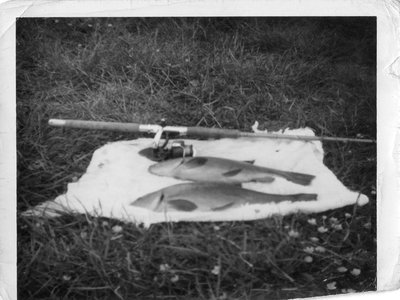Mopping the last of the egg yolks and bacon grease from our plates with a slice of bread (remember when bacon had fat, and not that white shite that oozes from it now?) the keeper asked how the fishing had gone.
“Come and have a look” we said, and he walked down to the water with us. The thrashing net of fish was hauled from the water and tipped out onto a wetted groundsheet, a fine catch of fourteen glistening tench was quickly photographed before being slipped back none the worse for their ordeal.
“Jolly well done” he said, and went back to do the washing up. That was a PROPER bag of tench, perhaps not in Fred Js class but, never the less, still a fine bag.
So it seemed blood was the answer. It certainly did no harm, that’s for sure. Exhausted now, we fell into the tent and slept the sleep of the righteous, well content with our morning’s fishing. Waking that afternoon, we repeated the process: a light raking, followed by groundbaiting with our last remaining bucket of – by now – decidedly ripe blood. The warm weather certainly hadn’t done it any favours! Again a good catch was made the following morning. Now out of blood, we still had decent catches on the remaining mornings and returned home well chuffed with our few days fishing.

Two tench at a sitting – wow! A brace from the forest lake, June 1963
As the summer wore on we continued to visit the lake, but after those first few weeks the tench started to get finicky. The large lumps of flake that had served us so well during the opening weeks began to lose their effectiveness, and the answer to that was maggots – and lots of them. Small redworms were a good bait too, but the bites were miniscule by comparison to the sail-away affairs of the first weeks. With the summer now on the wane, this was a problem that would have to wait until the “64 season came around to be addressed. The winter’s pike fishing seemed to pass by quickly and before we knew it we were into the close season once more. That didn’t pass so quickly, and thoughts turned once more to the lake and its tench, particularly the problem of the tiny bites when maggot fishing. We had heard of the lift method (again from Fred Js writings) as a means of overcoming shy tench, but his way of fishing, it seemed, was rather crude, being a large shot pinched on a couple of inches from the hook. You then waited for the float to lift and tip over. This meant that once the float was flat the fish would feel the full weight of the large shot. We felt that our tench were far too fastidious to put up with that. To that end my father designed and made a set of antenna floats with long stems made from a dense type of wood, the bodies being cork. These were shotted with the bulk shot up the line. They would then cock with nearly all the stem out of the water, probably eight inches or so. Then, with the addition of a small shot close to the hook, they would sink to their tips, very finely balanced. This meant that when a fish picked-.up the bait , the float would rise, the motion taking most of the weight of the small shot, until the float stopped lifting and the fish would feel the full weight of the small shot. The trick was to strike before the float stopped lifting. That was the theory anyway, but would it work in practise?

The lift method worked! Summer 1964
The answer to that was most definitely yes, superbly in fact, and this, i still think, is proper lift fishing in its pure form. Super catches were made when the tench went into fussy mode; in fact, on one especially drizzly, overcast morning when the fish fed-on much later than usual. my father amassed a great catch of 27 fish using this method. Of course today the problem would be sorted out by a self-hooking bolt rig. You can use this ghastly method if you wish, but to me that ain’t tench fishing. Its ok for carp, but then any method is, up to and including shotgun in my book!
That was a bit controversial wasn’t it? Purely my view of course.
I still have this boxed set of floats but am loathe to use them in case of losing them;nonetheless I continue to use the method with shop-bought floats that are very good these days. We continued to fish this very Crabtree-type water in its lovely surroundings throughout the remainder of the 60s, the last two trips being at the start of the ’69 season. Some halfwit, we then discovered, had tipped a load of water pigs into it. The water had lost it lovely clarity and the weed started to die off due, no doubt, to them grubbing-up the bottom and restricting light penetration. Oh well, nothing lasts for ever does it? But we were gutted: a lovely water ruined. One thing that i never managed was to catch 20 tench at a sitting, something that i would have liked to achieve.I had come close sometimes, on other waters as well, but had never quite made it. It was to be a lot of years before i did.










